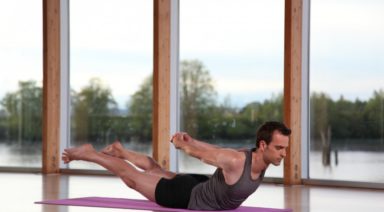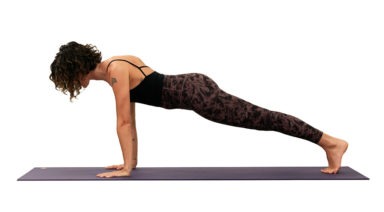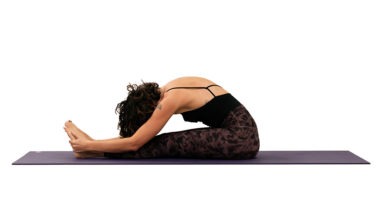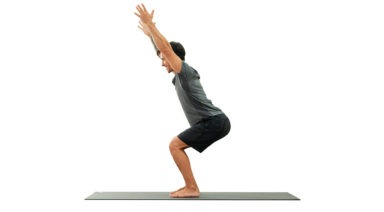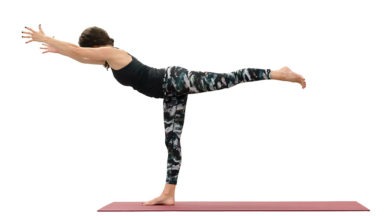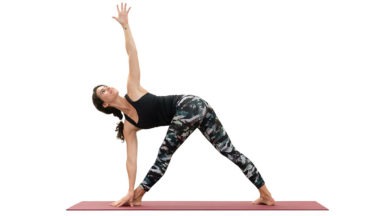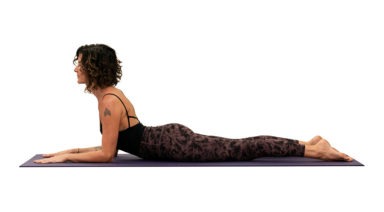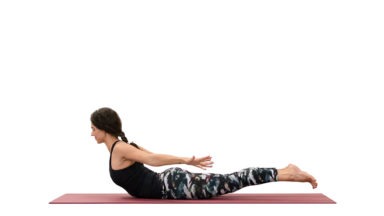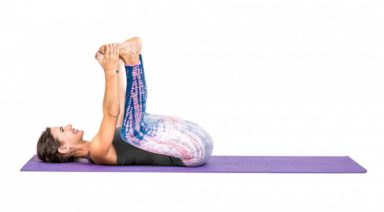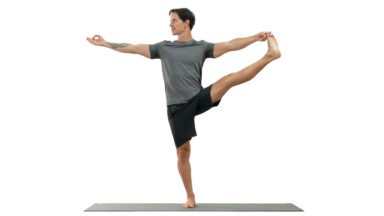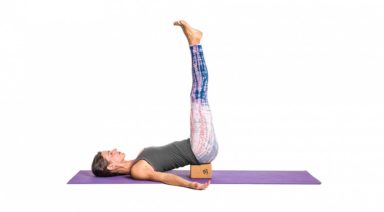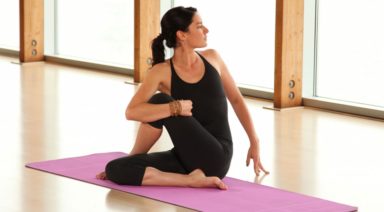8 Reasons Why Yoga Makes You Happier and Healthier

Develop Superpowers With Yoga
Yoga stretches the body, supports circulation, flushes the lymphatic system and stimulates major organs. It also alleviates common ailments and may be considered preventative medicine.
1. Reduce Pain
According to Harvard Health Publications, several studies found that a weekly yoga practice can reduce lower back pain and may be more effective for addressing pain than standard medical care or exercise therapy. Yoga improves the daily function of people struggling with curvature of the spine due to fibromyalgia and osteoporosis-related conditions.
2. Alleviate Anxiety
Anxiety has become one of the most common disorders in the US and studies have shown that yoga may be more effective, and possibly less expensive, than pharmacological treatment in alleviating symptoms, according to a 2007 study published in Evidence-Based and Complementary Alternative Medicine. The study found that a yoga session increased brain Γ-Aminobutyric (GABA) levels by 27 percent in yoga practitioners; anxiety and depression are traditionally associated with low GABA levels.
While yoga may not erase all attachments to a painful past, another study found that it can promote healing for people with Post-Traumatic Stress Disorder (PTSD) through peaceful embodiment and an awakened sense of calm.
3. Get Out of the Clouds
Conducting scientific studies to prove that a yoga class has a positive effect on the mood may seem unnecessary to a dedicated yogi but nonetheless, when those who struggle to get out of bed manage to muster the strength to strike a pose and breathe through the low point, the effort is proven to uplift.
Researchers at UCLA, Moscow Research Center of Narcology and University of Bologna, found that, of the 17 subjects that completed the study: 1) all experienced significant reductions in anger, depression, neurotic symptoms and low frequency heart rate variability; and 2) 11 of the 17 subjects achieved remission levels post-intervention. Not only does yoga have the power to reduce depression, but it is potentially a practice that can sustain improved mental health.
4. Reduce Risk of Cardiovascular Disease
According to a 2014 study published by the European Journal of Preventative Cardiology, adults involved in a yoga practice, compared to those who did not exercise, exhibited improvements to body mass, weight, blood pressure and cholesterol, over time. The evidence is promising for cardio-metabolic health.

5. Improve Quality of Life for Cancer Survivors
Many studies explore quality of life impacts, as well as psychosocial and symptom-management benefits, of yoga as an intervention tool, usually with positive findings. For example, a 2012 study published in the journal of Evidence-Based and Complementary Alternative Medicine supported preliminary evidence of the significance of yoga for improving quality of life and symptoms in cancer survivors.
6. Improve Gene Expression
According to a 2013 study conducted by researchers at the University of Oslo and Oslo University Hospital, yoga can improve gene expression, especially in terms of immune function. Experimental sessions of gentle yoga postures, breathing exercises and meditation had a significantly greater effect on gene expression in peripheral blood mononuclear cells of subjects, compared with the control group protocol of walking in nature and listening to relaxing music.
Nature explains that, “genes encode proteins and proteins dictate cell function.” Gene expression refers to the ability of DNA to replicate, express and repair itself. Improved gene expression may be connected to improved immune function, cellular integrity and adaptability, in the evolutionary sense.
7. Support Smoking Cessation
Yoga may squash cravings in general but it has also been proven to reduce perceived stress and negative affects associated with smoking cessation, according to a 2012 study published in the Journal of Women’s Health.
8. It’s Never Too Late
It is never too late to get started or resume your yoga practice. Patanjali’s first Yoga Sutra states “Now begins the practice of yoga.” Remove the limitations that you identify with from the past, as well as your expectations for the future, and just get on your mat.
An Ancient Practice That Can Heal
Stress has become a way of life. Whether the days are full of multiple goals and endless obligations, traffic jams and transit delays, complex systems of bureaucracy and finance, or an overwhelming array of in-person and virtual relationships, the pace of current human existence is bursting at the seams.
“Yoga has the power to heal the world, one human at a time.”
For centuries, sages have relied on yoga to transcend earthly limitations. Each meditative pose is an effort to identify pockets of pain that accumulate inside the body. Each inhale confronts suffering. Each exhale is an attempt to transcend it. Through this process, worry is replaced with loving kindness. Now, bodies of research are proving that yoga is more than a niche spiritual force for particularly enlightened beings.
How to Tell If You’re Being Controlled by Your Mind or Intellect

We make decisions every day. These decisions can fall under a few categories: ones we feel good about, ones we feel badly about, and ones that don’t make us feel anything.
The decisions we make can make our lives heaven or hell to live in because everything in this world is subject to the law of cause and effect, also known as the Law of Causation. We know what happens when we decide to drink too much alcohol one night. The next morning, we feel sick, tired, and most likely have a headache.
We won’t be able to function optimally and we suffer. Yet, even with this knowledge of the effect, people still decide to drink too much alcohol all too often. In order to understand why people do this to themselves, we have to break down the types of equipment we have as humans and better understand their functions. These understandings come from Vedanta: the ancient teachings of yoga as described in the Bhagavad Gita.
As humans, we are made up of matter and spirit. Spirit is the consciousness that gives rise to our matter. Spirit is your highest Truth. Without Spirit, there would be no matter. Our matter is comprised of three types of equipment; the body, the mind, and the intellect. The body is, of course, your physical manifestation with your organs, limbs, skin, bones, etc. This is what makes you tangible. Your mind is defined by Vedanta as the home of all your emotions like love, hate, anger, jealousy, joy, etc. It is also the home of your desires, likes, and dislikes.
Your mind is where your preferences live. And lastly, your intellect, your third and most important equipment is your ability to be objective and discern what is truth and what isn’t true based on knowledge and wisdom. Your intellect is the mature reasonable part of you that can question and think for itself when there’s adversity and when others are imposing their opinions and ideas on you. Your intellect stays centered regardless of the chaos happening externally.





